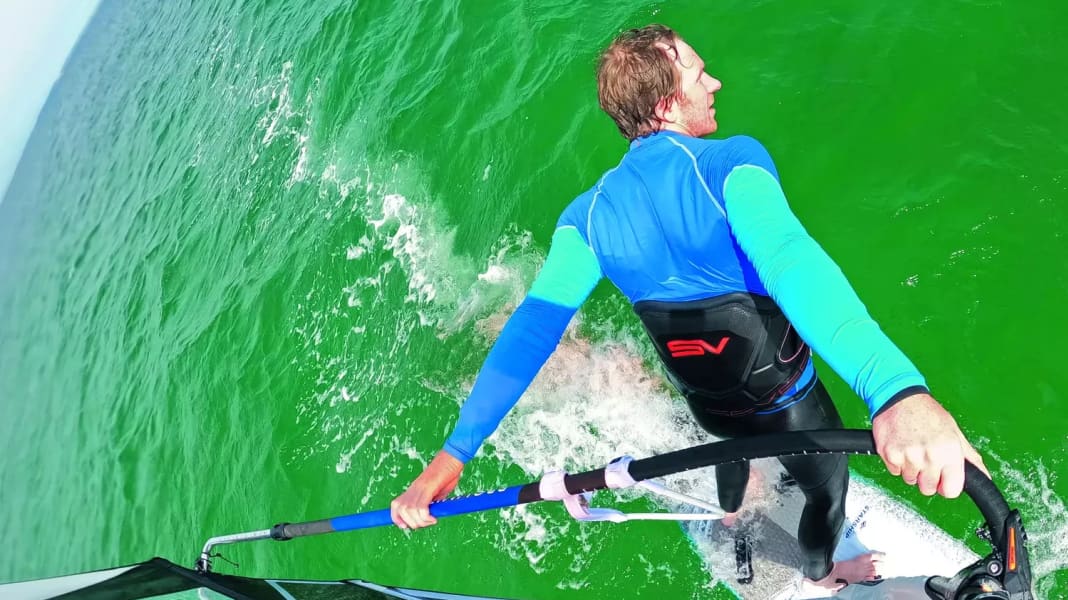The booms are included in the test:
- Aeron HD 29 160-220
- Aeron SL 26 150-200
- Chinook Pro1 Alloy 150-212
- GA Sails Black Line 150-200
- Goya aluminium 150-200
- GunSails Advantage 160-210
- Neilpryde XFS Wave 150-200
- Point-7 Alu Pro 160-210
- Prolimit Team RDG26 160-210
- Prolimit TCS 150-210
- RRD Dynamic RDM 160-220
- Severne Blueline 160-220
- Severne Metal 150-200
- STX RDG 160-210
- Unifibre Alu Essentials Monocoque 160-210
- Unifibre Alu HD Monocoque 160-210
Aluminium forks traditionally offer the most interesting combination of stiffness and a good price-performance ratio for many end customers. Although ambitious wave surfers and racers in particular opt for carbon versions, these are around three times more expensive than the 16 aluminium models tested here. We would have loved to present the AL360 to you, but unfortunately the requested test model was delivered late. We will provide you with this fork in the next issue.
Click through the fork test results:
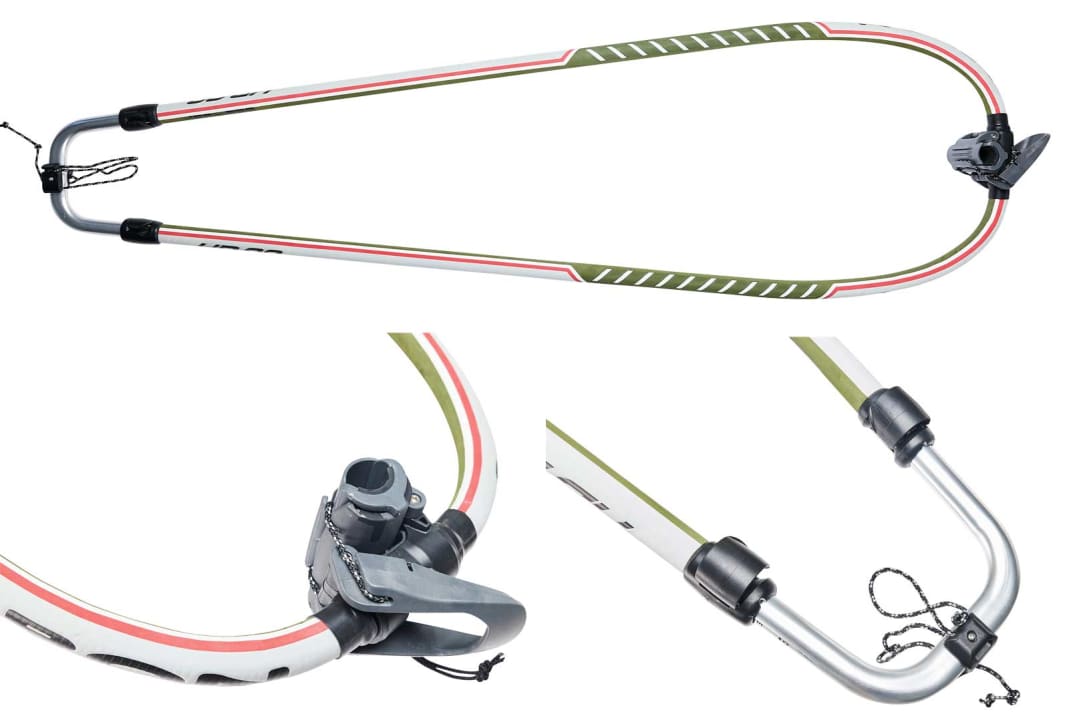





You can find all the technical data in the article below!
Adjustment ranges: Medium to XXL
In general, not all models are offered in exactly the same length, and the adjustment ranges also differ slightly. 50 centimetres is still the standard, but forks such as the Aeron HD, ProLimit TCS, RRD Dynamic RDM and Severne Blueline also offer a significantly larger adjustment range of 60 centimetres in some cases. The leader in this respect is the Chinook Pro1 Alloy with a whopping 62 centimetres of adjustment range - a complete sail range of 4.0 to 7.2 easily fits into it.
Overall, however, the specified adjustment range should be treated with caution, as fully extended aluminium forks increase the risk of bending the bars in the event of a skid or a hard landing. From this point of view, carbon forks have clear advantages, as they allow you to utilise the full adjustment range without the risk of bent tubes. OurRecommendation for aluminium forks is: The forks should only be extended to the last hole by light surfers (<75 kilos). Heavier users should ideally leave a five-centimetre safety buffer. So if you are looking for a fork for a sail with a boom measuring 198 centimetres, for example, you should ideally not choose a model with an adjustment range of 150-200 centimetres - but rather a fork whose adjustment range only ends at 210 centimetres.
Tips for the adjustment systems
In the past, we have occasionally observed larger deviations in the length specifications of the forks, which is why we re-measured them: This time, the printed length specifications on all test forks were correct. There are also differences in the pin fasteners for adjusting the length: with the exception of the Aeron HD and the Severne Blueline, all test models have double pins, meaning that two metal pins engage in the holes. Chinook uses double pins made of plastic instead of metal, which reduces the potential for corrosion (steel in contact with aluminium).
Overall, all adjustment systems are easy to operate. The clips from Chinook, GunSails, Severne (Blueline), STX, Aeron (HD), Point-7, GA Sails and Unifiber (Essentials Alu) are particularly easy to operate even with clammy fingers. On the ProLimit Team, however, the adjustment system is somewhat sharp-edged.
Here is a tip forBearing of the forks: With many pin fasteners, the plastic clasps are pulled apart when opened and should only be stored closed for longer periods of time (e.g. winter break), as otherwise they will wear out and no longer close properly. This applies to all adjustment clips with the exception of the Chinook Pro1, Aeron HD 29, Severne Blueline and Unifibre Essentials models. So if you want to prevent such clips from sticking in the tube during the winter break, ideally remove the tube, rinse it once with fresh water and store the end piece and the spars separately - with the clips closed. Rinsing is recommended for all forks after saltwater use.
Fork spar diameter - confusing manufacturer specifications
The diameter of the bars is decisive for how relaxed you can grip while surfing. All brand specifications always refer to the bare tube, without the coating. This practice is quite confusing for the end customer, which is why we measure the actual diameter of the bars in the grip area. A spar specified as 26 millimetres quickly becomes 30 millimetres with a pad.
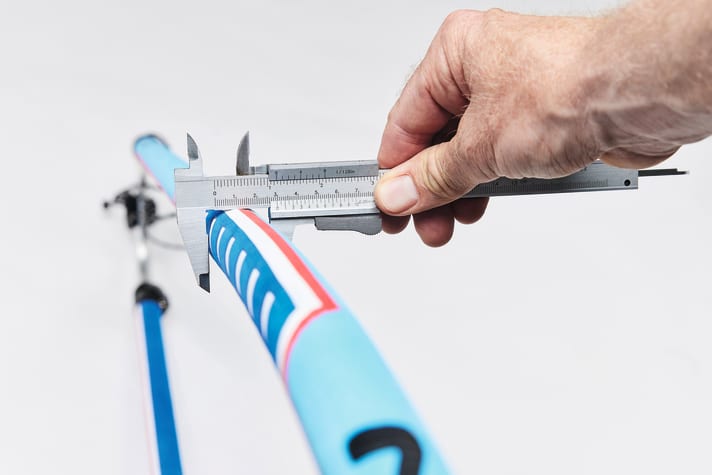
The thinnest spars in the test field are offered by the STX RDG with a measured 28 millimetres and the GA Sails Black Line with 29 millimetres. However, while the thin 28 mm diameter of the STX extends all the way to the rear, the GA Black Line thickens to a whopping 33 millimetres just behind the trapeze lines - so the rear hand has to grip more firmly than the specification suggests. The Chinook Pro 1, Aeron HD, Severne Blueline and the Unifiber Alu Essentials also have particularly thick spars of 32 millimetres.
Of course, you also get used to the thicker bars. However, those who often struggle with exhausted forearms will notice a noticeable improvement when switching from 32-millimetre bars to thinner tubes, for example - two to three millimetres feel like a world. The only way to save even more energy is with the carbon models known as Slim or RDM forks, which are in a league of their own with a real 27 millimetres (manufacturer's specification: 24.5 millimetres). Here you can find a test with carbon forks >>
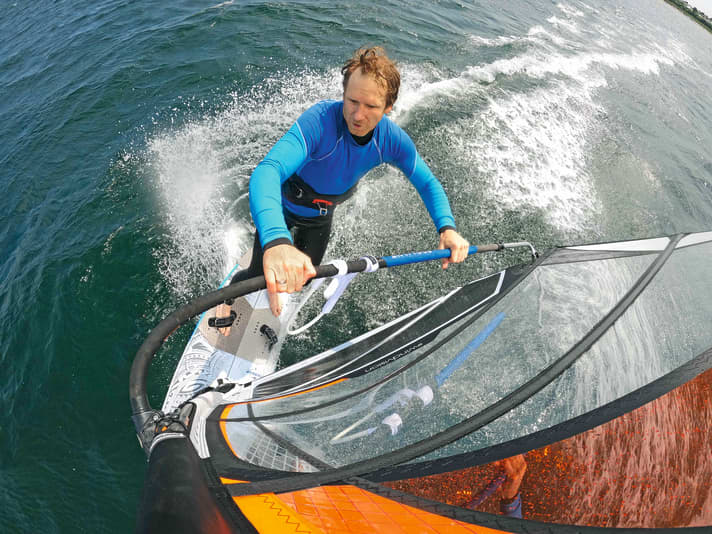
Boom stiffness - measured value vs. reality
Good stiffness values are important in order to achieve a direct ride feel and good power transfer when pumping. How stiff a fork is depends on many factors - e.g. the diameter of the bars, the wall thickness of the bars and also the material used. If, for example, the bar diameter is reduced for a more comfortable grip, this makes the fork softer. This could be compensated for by thicker walls, but this in turn increases the weight.
Conversely, aluminium forks with thick bars can also be stiff if the wall thickness is reduced - which can result in low weight. The disadvantage is then felt in the form of grip comfort on the thick handlebar. An aluminium fork that is as light, stiff and thin as possible is therefore not feasible from a physical point of view. If you are looking for this, it is best to switch to a carbon fork with a reduced bar diameter, but then you will have to dig deeper into your pockets.
This is how we tested
We determined the stiffness values for all test forks: Once in a half-extended state and five centimetres before the end of the adjustment range. During the measurement, the forks are suspended from a bar and slightly preloaded to determine the zero point. The spars are then pulled apart with 35 kilos - a value that is easily achieved on the water when pumping with large sails - and measured again.
The NeilPryde XFS Wave turned out to be particularly stiff on the stretching bench, achieving the best value in both measurements. When half extended, it can be pulled apart by just 2.8 centimetres, when fully extended by 3.5 centimetres. The Chinook Pro1 was particularly impressive in the half-extended range (2.8), while the two Unifibre models were particularly impressive at the end of the adjustment range (3.7). In contrast, the ProLimit Team (4.0/4.5), RRD Dynamic (3.7/4.6) and the STX RDG (4.3/4.9) were rather soft. We include the values in the individual descriptions.
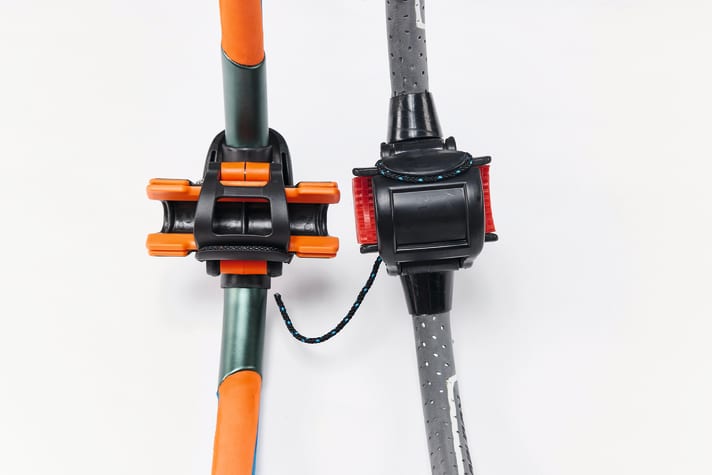
However, these figures should not be over-emphasised, because: A firm connection between the head piece and the mast is also decisive for the subjective feeling of stiffness - a factor that we did not measure, but determined in a practical test with the sail rigged. Forks that have a long contact surface on the mast in the head piece and can be attached tightly with the quick-release fastener thanks to a good gear ratio often sit particularly firmly on the mast.
Unifibre with removable front piece
The models from NeilPryde, Unifiber, Aeron and the Severne Metal perform particularly well in this respect. The two Unifiber models are worth mentioning in this regard: these offer a modular system in which the head piece can be clicked onto the spars within seconds. Theoretically, one head and end piece can therefore be used for several spar lengths, which can reduce the purchase price. Removing the head piece can also be an advantage when transporting the board in a board bag. Even when only clicked on, the head piece is already one of the stiffest - when screwed on with the bolts supplied, it becomes even stiffer and offers extremely direct power transmission from the fork to the rig.
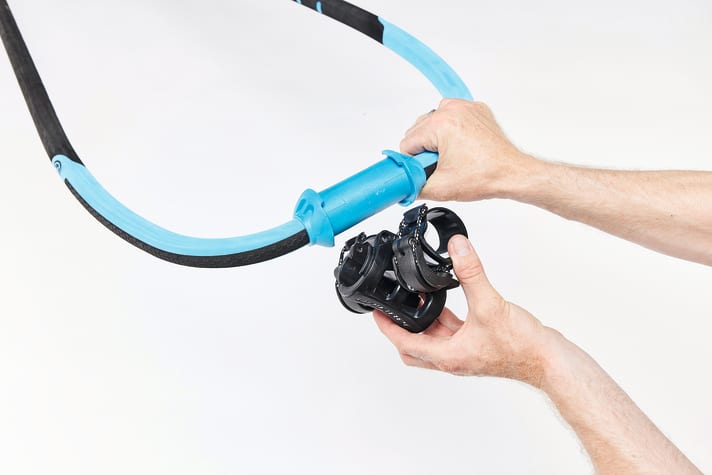
The bottom line is that most of the test forks feel stiff enough in practice, the differences are only noticeable in direct comparison. Only the very thin and inexpensive STX RDG feels a little spongy overall when heavy riders pull on the bars. We would therefore recommend these to lighter surfers (<80 kilos).
RDM, SDM or both?
Most test models can be used for both standard diameter masts (SDM) and reduced diameter masts (RDM) via a removable adapter. The GunSails adapter is secured against falling out by a simple rotary knob. Unifiber does not supply an adapter, but rubber pads of different thicknesses that can be quickly replaced. The Severne Blueline has been optimised for SDM masts, but the mast mount is also suitable for RDM masts without an adapter. The front piece of the Severne Metal, on the other hand, is only suitable for RDM masts, while the STX RDG can only be used with SDM masts.

Bending curves - from flat to bulbous
The bending curves of the test forks are also different. The GunSails Advantage and the STX RDG are very narrow both in the centre section and at the end section - which is good for flat-profiled wave or freestyle sails. However, bulbous freemove or even freeride sails are then noticeably faster on the leeward side. NeilPryde, Goya, Unifiber, Chinook and ProLimit offer the most space for those who like to rig bulbous profiles. The two Severne models are also particularly wide, but only in the centre section. Further back, Metal and Blueline are narrower. Note: The information on the bending curve refers to the tested length - some manufacturers give their models different bending curves depending on the length.
Technical data of the forks tested
AERON HD 29 160-220
- Lengths: 140-200/160-220/180-240/200-260
- Adjustment interval: 2 cm
- Price: 239 Euro
- Compatibility:RDM/SDM
- surf measurement: 2.69 kg/ spar Ø 32 mm
AERON SL 26 150-200
- Lengths: 130-170/140-190/150-200/160- 210/175-225
- Adjustment interval: 2 cm
- Price:239 Euro
- Compatibility: RDM/SDM
- surf measurement: 2.70 kg/ spar Ø 30 mm
CHINOOK Pro1 Alloy 150-212
- Lengths:135-197/150-212/165-227/185-247
- Adjustment interval:2 cm
- Price:299 Euro
- Compatibility: RDM/SDM
- surf measurement:2.68 kg/ spar Ø 32 mm
GA SAILS Black Line 150-200
- Lengths:140-190/150-200/160-210/180-230
- Adjustment interval: 2.5 cm
- Price: 279 Euro
- Compatibility:RDM/SDM
- surf measurement: 2.64 kg/ spar Ø 29 mm
GOYA Aluminium 150-200
- Lengths: 110-160/130-180/140- 190/150-200/170-220/180-230/200-250
- Adjustment interval: 2 cm
- Price:265 Euro
- Compatibility:RDM/SDM
- surf measurement: 2.74 kg/ spar Ø 30 mm
GUNSAILS Advantage 160-210
- Lengths:140-190/160-210/180-230/200-250
- Adjustment interval: 2 cm
- Price: 155 Euro
- Compatibility: RDM/SDM
- surf measurement: 2.70 kg/ spar Ø 30 mm
NEILPRYDE XFS Wave 150-200
- Lengths:140-190/150-200/160-210
- Adjustment interval:2 cm
- Price:359 Euro
- Compatibility: RDM/SDM
- surf measurement: 2.74 kg/ spar Ø 30 mm
POINT-7 Alu Pro 160-210
- Lengths:140-190/160-210/180-230/200-250
- Adjustment interval: 2 cm
- Price: 219 Euro
- Compatibility:RDM/SDM
- surf measurement: 2.67 kg/ spar Ø 31 mm
PROLIMIT Team RDG26 160-210
- Lengths:145-195/160-210/175-225
- Adjustment interval: 2.5 cm
- Price:279 Euro
- Compatibility:RDM/SDM
- surf measurement: 2.62 kg/ spar Ø 30 mm
PROLIMIT TCS 150-210
- Lengths: 139-195/150-210
- Adjustment interval: 2 cm
- Price: 269 Euro
- Compatibility: RDM/SDM
- surf measurement:2.80 kg/ spar Ø 30 mm
RRD Dynamic RDM 160-220
- Lengths:140-200/160-220
- Adjustment interval: 2 cm
- Price: 256 Euro
- Compatibility: RDM/SDM
- surf measurement: 2.84 kg/ spar Ø 30 m
SEVERNE Blueline 160-220
- Lengths: 140-200/160-220/180-240
- Adjustment interval: 2.5 cm
- Price: 240 Euro
- Compatibility:RDM/SDM
- surf measurement: 2.65 kg/ spar Ø 32 mm
SEVERNE Metal 150-200
- Lengths:140-190/150-200/160-210/170-220
- Adjustment interval: 2 cm
- Price:240 Euro
- Compatibility:RDM
- surf measurement: 2.50 kg/ spar Ø 29.5 mm
STX RDG 160-210
- Lengths: 145-195/160-210
- Adjustment interval:2 cm
- Price:199 Euro
- Compatibility: RDM/SDM
- surf measurement: 2.65 kg/ spar Ø 28 mm
UNIFIBER Alu Essentials Monocoque 160-210
- Lengths:140-190/160-210/180-230/200-250
- Adjustment interval: 2 cm
- Price:219 Euro
- Compatibility:RDM/SDM
- surf measurement: 2.83 kg/ spar Ø 32 mm
UNIFIBER aluminium HD monocoque 160-210
- Lengths: 140-190/160-210/180-230/200-250
- Adjustment interval: 2 cm
- Price:285 Euro
- Compatibility: RDM/SDM
- surf measurement: 2.96 kg/ spar Ø 30 mm
